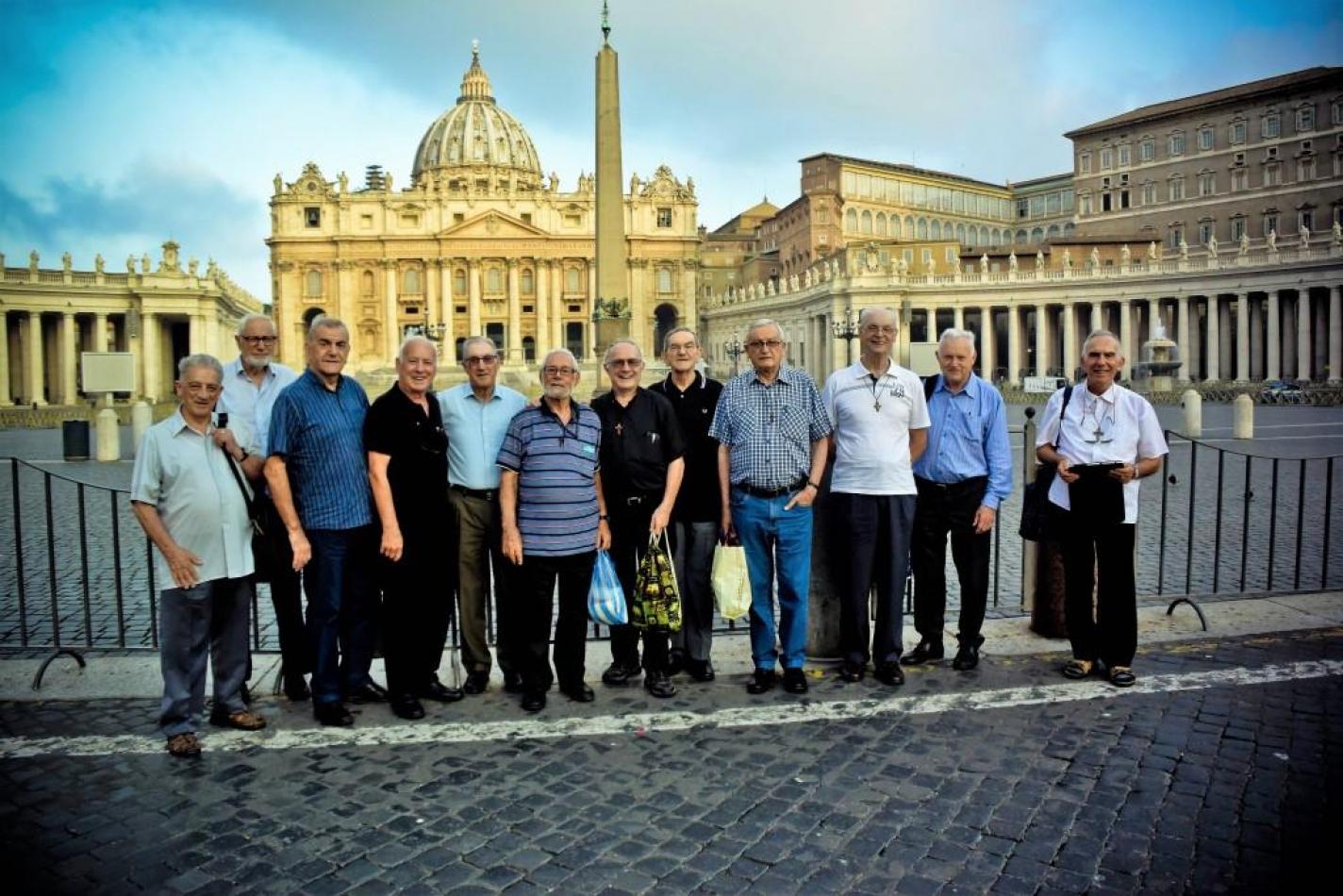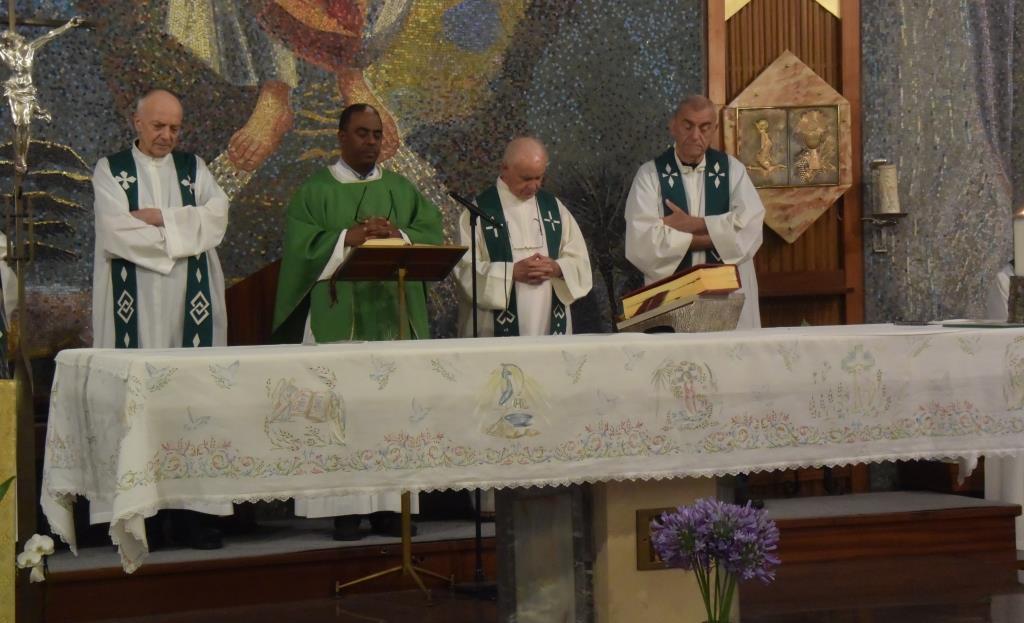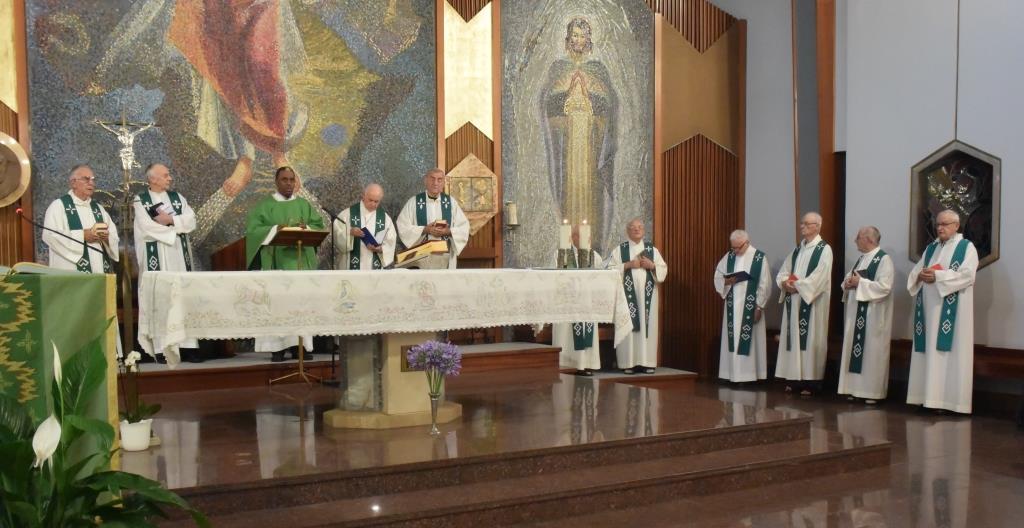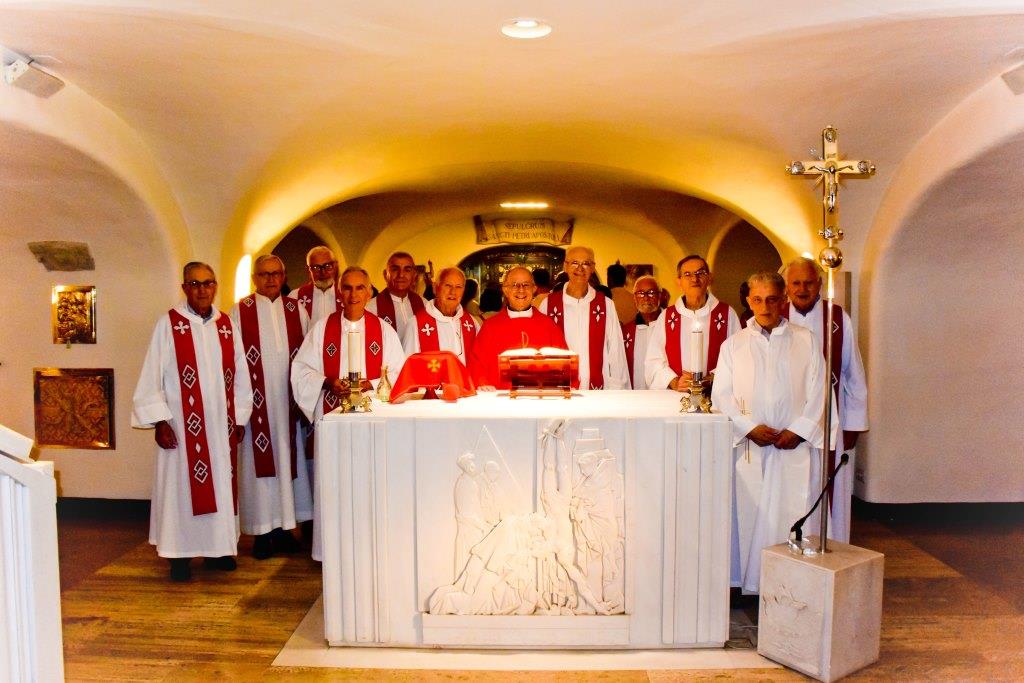Daniel Comboni
Comboni Missionaries
Institutional area
Other links
Newsletter
Tuesday, August 14, 2018
A dozen Comboni Missionaries, ordained to the priesthood in 1968, met at the general house in Rome on July 3-6, 2018. At the end of the meeting they shared a letter to summarize and remember what came out of their exchange of memories, thoughts and emotions. To convey all of this to their Comboni confreres we publish the letter here, presented in the name of the group by Fr. Gian Paolo Pezzi. It can be taken as their small contribution to the journey of the Family and of the Institute that welcomed them, formed them and sent them to the mission of Jesus and Comboni.
Letter from the class of ’68 to our Congregation
We met in Rome, EUR for three days, July 3-6, 2018, to review together what God has done in our priestly life which has now reached its 50th year. There were 12 (1) of us out of the original 44. Some have already returned to the Father (2), others have changed their life’s choice (3), and other could not make it for a number of reasons, such as the group from Portugal which decided to celebrate at home. This letter collects the feelings and the contents of what the 12 of us shared on our 50 years of missionary life. A leaflet will eventually gather the 50 years of service of the members of the entire group.
Gathered in Rome, in the community of the Curia, remembering and sharing the gifts and charisms (and they are many!) that God has given us during these 50 years, we thanked God who, in his infinite mercy, has accompanied, supported and assisted us along the path of life. The spiritual gifts we have received have deeply shaped our identity and are seen in the fields where we performed our service as ministers of the love of God. Together with the Apostle James we have recognized that if we have done anything good, we owe it to Him from whom all good things come (James 1:17). He is the one who supported us in our difficulties and weaknesses, who consoled us in desolation and failures (2Cor 1:4). Now more than ever we have the experience to say: We have recognized and believed in the love of God for us. God is love: he who abides in love abides in God, and God in him (1Jn 4:16). Basically this is the essence of Jesus’ message, and this was and must remain the inspiring strength of all our activities.
Together, we also thanked the Congregation and our confreres who helped us, who supported us in difficult times and who shared with us the joy of positive results. Now more than ever we may proclaim the love of God and console our brothers and sisters, that they, too, may ‘taste the goodness of the Lord (S. 33:9). In the Vatican grottoes, during the Eucharist, we could repeat with St. Paul: I fought the good fight, I finished the race, I kept the faith. Now the crown of justice awaits which the Lord, the just judge, will award to me on that day; not only to me, but to all those who have been waiting with love for his manifestation (Phil 4:7-8).
Looking back at these 50 years, we, too, with the psalmist feel the precariousness of earthly life: you have made my days a few handbreadths and my life is nothing in your sight. Surely everyone stands as a mere breath (Ps 39:5-6), and because of this with the psalmist we repeat: teach us to count our days and we will reach the wisdom of the heart (Ps 89:12). In biblical terms, the wise heart belongs to the one who knows how to discern the presence of God in life’s events and in human history. It is the heart of those who know how to read everything from God’s point of view, because everything works unto good for those who love God (Rom 8:28), even sins, we add with St. Augustine.
We belong to the generation that followed the devastation of WWII, a time of suffering, labor, and reconstruction from the ruined it caused. It has also been a time of ideological clashes between various tendencies of left and right, of huge social and political changes such post-colonialism and the fall of Marxism, to mention just a couple. But also, with VATII it has been a time of deep renewal for the Church which was started then, but has not yet been completed even after 50 years. For the first time, the Council opened the Church to the challenges of modernity, but not to condemn it, like the Syllabus of Pius IX did in 1864, and to the plurality of religions, seen in the perspective of God’s plan of salvation. It is also the time when humanity discovered globalization, in which also our Comboni Congregation has entered and is called to participate fully, no longer solely concentrated on the Comboni of history, with the limitations of its times, but based on the inspiration of Comboni the prophet, the man who, in the light of the Holy Spirit, opened the Church to new horizons. This is the question we always ask ourselves: what would Comboni do today, with all the richness of theological reflection and the variety of ecclesial movements that have developed since the Council?
Starting from this experience of history, we have thought that it may be our duty as “seniors” to pass on to future generations some of the spiritual wisdom we have accumulated over these 50 years, in the hope that it will help the Congregation to enlarge the size of its tents (Is 54:2-3) and deepen its prophetic charism. At our meeting we have summarized this spiritual wisdom in a few points.
1. Mission Promotion. At times it seems that this activity is limited to a vocation appeal, to ask for help for the missions abroad, or to search for personal friends and benefactors. Less present is a wider breadth of mission promotion of the ecclesial community and of the local Church in order to foster around our communities the growth of all kinds of groups animated by the Comboni charism and capable of engaging in positive and creative activities in the fields of mission, and of a specific engagement in promoting Justice and Peace, and the Integrity of Creation.
2. Inter-religious dialogue. This is the true novelty and richness of VATII. For the first time in its history, the Church looked outside of itself and took into consideration humankind in its entirety, which on the whole moves outside its sphere. For the first time, the Church spoke words of salvation for all of humankind and accepted that it, too, lives in the light of the creative Word of God who illumines all who come into the world (John 1:9). VATII freed the path of evangelization from any “tribalistic” attitude (religious included), and from proselytism steeped into a negative attitude towards those who are faraway and different. VATII, and after it the entire ecclesial community, moves us urgently towards a true and deep “dialogue” with other religions and the surrounding human reality. Where do we, Comboni Missionaries, stand in this regard? Where is Comboni’s prophetic stance in our evangelizing activity? We believe that for us the road ahead is still long.
3. Continuity of commitments. Concrete situations and requests have led, and still lead, Comboni Missionaries, including us, to accept specific commitments, often highly specialized, that seem to be fortuitous happenings, but then turn out to be providential. Many initiatives are then started by confreres gifted with a wide and deep vision of the human and ecclesial reality. By nature these are long range initiatives that require time. They should not be cut short, perhaps by someone coming in uninformed, thinking that everything has to be restarted from scratch, following one’s personal views. Thus, initiatives end up dying in the whirlwind of change. Knowing that, in our case, change is not due to personal choices but to generational realities, we feel the need to ask people in charge to make precise choices, evaluating which initiatives need to be continued, being seriously informed, so that some qualified commitments, still under our care, will continue for a better service to the Church and to mission.
4. Community and communion. In our discussions, we acknowledged that at times we have lived in “Comboni communities” that were more similar to “cohabitations” then to true communities. This is true above all in the realm of internal communication, mutual knowledge, sharing of material and spiritual goods, community councils. We believe that we need to point out to people in charge that, in our experience, this is a fundamental element in our mission. We are not business people, albeit efficient ones, but witnesses of a Gospel that we can only proclaim together, as united communities.
5. To be one with the people. This is nothing new in missionary activity. Since forever we have been told that the missionary must enter into the culture of the people to whom he has been sent, going beyond his own native culture, studying and loving the language and the culture of his new people. It seems, instead, that we are beginning to think that this is no longer a priority. Perhaps some self-criticism would help us to be closer to the people to whom we are sent. The great examples of the past, such as the Jesuit Matteo Ricci († 1610), should not be forgotten. But how many people still see him as an example to be followed? Discernment by those in charge could help overcome obstacles in this field.
Fifty years of missionary life do not authorize us to lecture anyone, but our lengthy experience has come up with these points of reflection that we offer to our confreres. For many of us this will also be a time of revision and planning. We promised one another that we will keep in touch with our entire group and be remembered in prayer. But we offer and request this gift of prayer within the entire Comboni Family, that we may all be open to the voice of the Spirit who blows where he wills: you hear his voice, but you do not know from where he comes or where he goes (John 3:8).
United in prayer,
Fr. Gian Paolo Pezzi
For the Group of 12 ordained in 1968, gathered in Rome, July3-6, 2018
[1] Gian Paolo Pezzi, Giovanni Taneburgo, Giuseppe Brunelli, Francesco Laudani, Giuseppe Scattolin, Raffaele Savoia, Marillo Spagnolo, Egidio Tocalli, Johannes Hans Maneschg, Jimenez Calvo Santiago, Marco Passerini, Giocondo Pendin.
[1] Antonini Francesco, Bellezze Gino, Berteotti Paolo, Conway Dennis William, Gobbi Gian Battista, Moroni Ferdinando, Orozco Gutierrez Joaquin, Tomasoni Francesco, Zanotto Luigi, Diaz da Cal Antonio.
[1] Diaz Da Cal Antonio, Garcia Manuel Coria, Llamas Martinez Raúl, Olindo Pinto Marques, P. J. Cunha e Silva, Perna Jacob L., Ropelato Aldo, Villa Lobo José.







